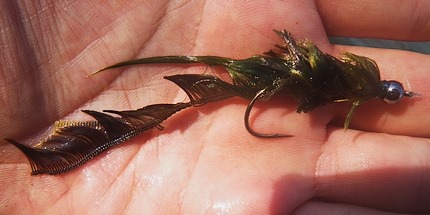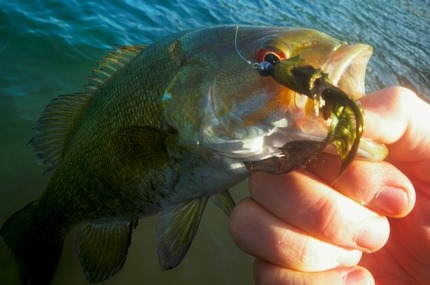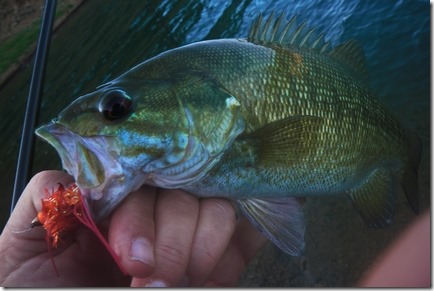With the lawnmower disabled all thoughts of chores and responsibility were discarded in a hurry, and with only a scant few weeks remaining before silvery plankton eaters invade my waterways, I was intent on finishing up my spring project, rerolling the classic Texas worm rig into a fly.
Lake Berryessa being so close – and fish being visible and numerous makes for a good test bed. Clear water allows me to see the motion of the each faux rubber candidate, and visible fish allowed me to think victory as they approached – and defeat once they paused shy of eating the dang thing.
For “Dokter Frankenstein” only mass acceptance would be a surefire sign of a good design, as few tools in a bass angler’s arsenal are as consistent as a big purple jellyroll served with a side of egg sinker …
The wind was blowing a good clip on Saturday, and I’d planned on heavy flies and breeze, opting for a 10.5’ #7 Orvis I had purchased on eBAY some years back. It was a monstrous stiff rod, better suited for an #8, but was just what was needed to keep unwieldy flies from burying themselves in my hindquarters.
I opted for a Type VI sinking shooting head, as my plan was to fish the small coves that occur with regularity along the bank. As a right-handed caster I had to walk left to keep rod and line out over the water, and the cove indent allows me to cast to the other side and “walk” my “worm” down the far bank before stripping it back to me across the belly of the cove.
In these conditions you don’t have to cast far, as most of the fish are within 20 foot of the bank, getting the fly down to them fast enough is the real issue, and a real problem.

The above picture showing a deep cove that allowed me to fish most of both sides, versus (below) a shallow cove that I could fish in a single pass down the bank.

Mud plumes caused by wind and boat wakes keep me a bit less visible than normal, allowing me to splash around as much as needed when the bank is obstructed.
I was reminded of last week’s rib mash when I discovered the silver dollar sized hole I’d torn in the left boot when I slammed into the hillside. It was the shore-facing leg, and bothersome, but not as critical as the right boot which is planted deepest.

Mix 15 turns of 3 amp fuse wire and 5.5mm bead to the front of a #2 wide gaped popper hook, and you’ve got the aerodynamic equivalent of the Spruce Goose, minus a few engines, and no ability to control its flight shy of the full head out of the guides to coerce the lumbering SOB away from an arse cheek.
Every puff of breeze brought an involuntary full-body clench, anticipation of impact shoved knees together, hat down to protect eyes and face, and cork grip white-knuckled knowing one of your limbs was likely in jeopardy.
I remember thinking to stuff my jacket in the rear pocket of the vest figuring it would staunch any bleeding. Arms were left defenseless as I’d be able to pry the hook out by sight, a back wound would have me operating by feel therefore needed additional protection.
While much refinement remains, the liveliness of the fly is without equal. But getting it to the water remains a bit problematic. The fish gave it a great reception, and I managed to catch both large and smallmouth on the fly in its debut.

Five inches of tough polyester ribbon yarn make the tail portion indistinguishable to the action of a rubber worm. I just need to lighten the fly to make it more comfortable to cast. As it is now the last 20 feet of the retrieve the fly is ticking off the rocks as you draw it to you, so it is making bottom early and prone to snags.

The crayfish was a welcome change up for those coves with shallow water. The bright colors make it quite effective in the mornings, and a bit less so at midday. I used both in the morning, and stuck with the muted tones of my Olive “worm” for the bright sun of midday.
The lake is starting to show a few aggressive fish, but the main body of the lake remains docile. All the folks I talked to on the bank mentioned the visible fish ignoring lures of any type, a condition the locals insist are characteristic of “pre-spawners.”
We’ll continue to refine this beast over the next couple of weeks prior to Shad showing, on the surface the pattern holds some promise.
